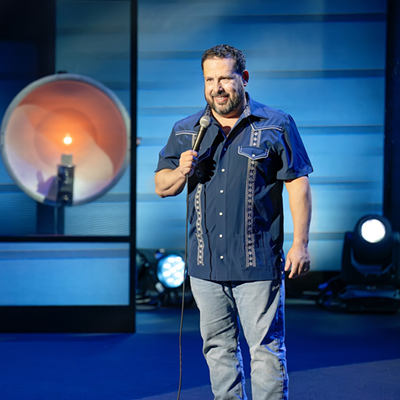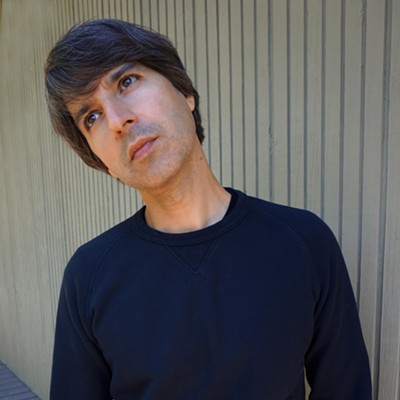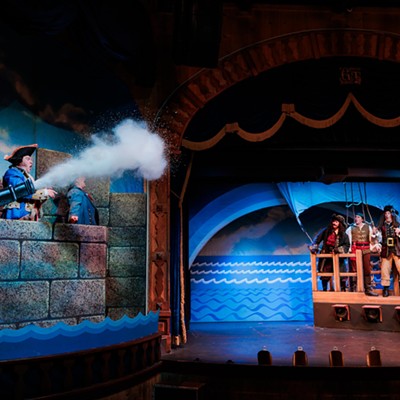The 2002 album Un Gran Dia en el Barrio, the recording debut of the New York City-based salsa group, was nominated for (but did not win) the award for "best salsa album" at the Grammys three years ago. This year, however, the 13-piece ensemble took home the award for its second CD, Across 110th Street.
Tucson music fans can get a taste of salsa à la the Spanish Harlem Orchestra when pianist and music director Oscar Hernandez brings the group to town for a concert Tuesday, March 14, at the University of Arizona.
Hernandez, 51, has enjoyed a career of 35 years (so far) in Latin jazz. He has played with a variety of world-renowned artists, including Tito Puente, Celia Cruz, Julio Iglesias, Machito, Ray Barretto, Willie Colón, Kirsty MacColl and Earl Klugh, among others.
He worked for years as the music director with the band of Ruben Blades, who also makes a guest appearance on Across 110th Street, which has been noted as Blades' return to salsa after 10 years playing other styles of music.
Hernandez also was music director for Paul Simon's Broadway musical The Capeman, a controversial Latin jazz-based show that was shuttered criminally early. But Simon and Hernandez also produced an accompanying studio album that has been lauded by some critics as brilliant. It's well worth seeking out.
"I've definitely paid my dues in the business," Hernandez chuckled on his cell phone this past Sunday night, while taking a break between sound check and performance in Kona, Hawaii. His 5-year-old orchestra was due the next morning to fly to the West Coast to continue its tour.
"I have been fortunate because I am in a good place to help people understand how to carry on the tradition of the way this music should be, because that tradition has kind of been lost in the last 10 or 12 years," Hernandez said.
But, wait, hasn't Latin music benefited from the well-publicized and renewed attentions of pop's mainstream during that period? Yes, but that has resulted in a watered-down version of Latin jazz, Hernandez said.
"I call that stuff pop salsa," he said, diplomatic enough not to name names.
"It is devoid of the key elements that this music about. The records today are superficial. A lot of those records today are recorded with click tracks," electronic rhythm keepers that opponents argue give a song a mechanical precision.
"It's all about the singer. There's no room any more for creative input from the musicians."
The salsa of the Spanish Harlem Orchestra sounds more organic because it reflects the personalities and styles of the musicians involved, often through improvisation, Hernandez said.
"We try to leave a lot of room for solos and for the members of the ensemble to exercise their creativity, just like they used to do in the records of the 1950s and in the '60s and in the '70s."
Such as the classic material of Puente, Cruz and Colón. Some fans call it salsa dura, or the hard classic salsa sound.
By the way, Hernandez noted that calling this music salsa was basically born from marketing necessity in 1950s. "And it has stuck. But basically what we play is the traditional Afro-Cuban music of the tropics."
There's a seductive syncopation in salsa that insistently moves your hips. It is, Hernandez said, partly the result of musical evolution and partly a textbook example of the whole definitely being greater than the sum of the parts.
"It's really the combination of the way the rhythms evolved and the role of each of the instruments evolved. What each instrument plays interweaves with what each of the other instruments play, and how they lock rhythmically lock with each other.
"Sometimes we do clinics where we show the students or whoever the separate parts, how the bass and the piano and the horns, then the congas and timbales sound by themselves, and then how they are layered on each other to create this amazing effect."
Hernandez has been around long enough to have the experience and wisdom of an elder but is still young enough to have the drive to put his band through its paces as a worldwide ambassador of Latino music.
"Our music has been traveling the world. We've toured Europe 14 or 15 times, and been to Hong Kong. What a joy it is to wake up one day, and you're playing Latin jazz in Dublin or Glasgow or Prague. Wherever you go, there's always huge fans of this music. And thank God, there are some Latinos wherever we go, too!"
The March 14 concert by the Spanish Harlem Orchestra begins at 7:30 p.m. in the UA's Centennial Hall, 1020 E. University Blvd., just east of North Park Avenue. General admission tickets cost $18, $28 and $36, with discounts available for UA faculty and staff, children, senior citizens and military personnel. Call 621-3341.







